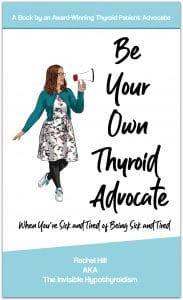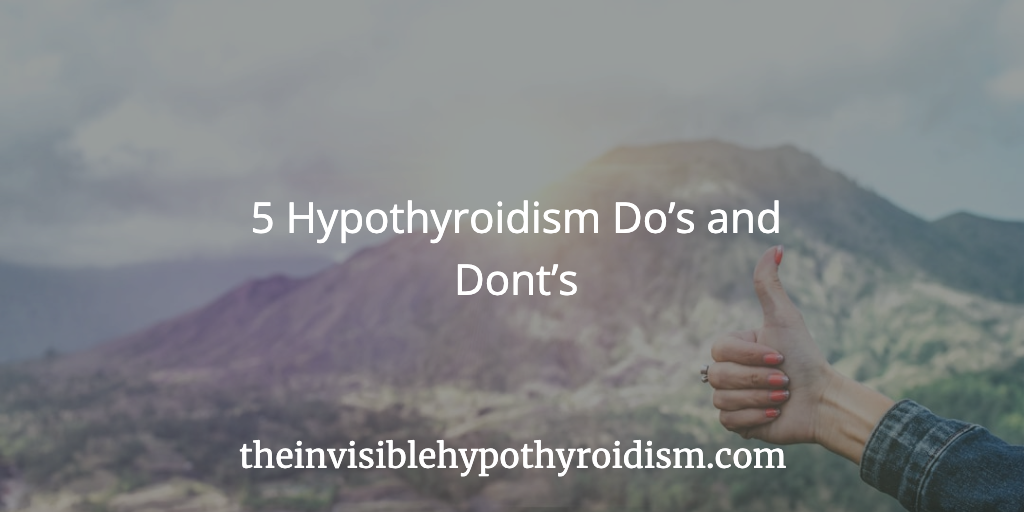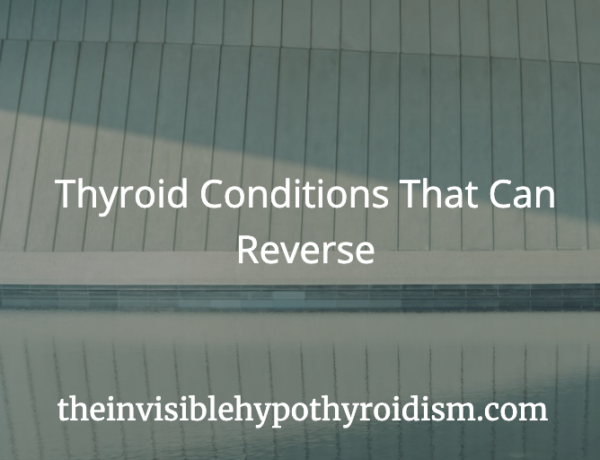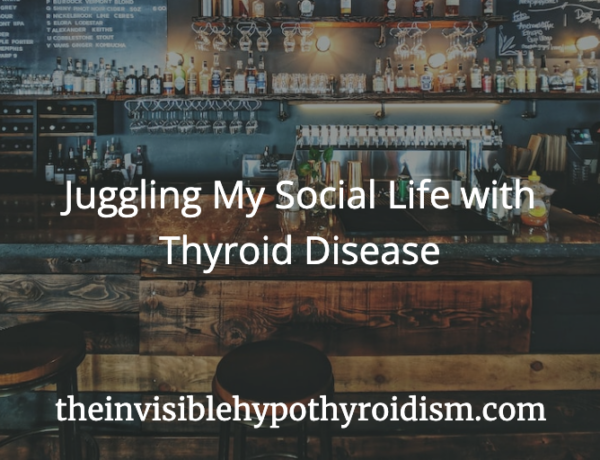When it comes to having Hypothyroidism, there are both some important do’s and don’ts for achieving wellness and reaching a point of being in good health with it.
Whereas many thyroid patients do just fine on the standard T4-only thyroid medication and seem to require no further interventions or adjustments, many also do not respond as well, and for these patients, learning some of the key things they should and shouldn’t be doing to look after themselves may be crucial in their recovery back to a good quality of life.
Check out my full checklist of thyroid jigsaw puzzle pieces here.
1. Thyroid Treatment
Don’t: Settle for Inadequate Treatment
Do: Consider Other Options if The First One Doesn’t Work
When it comes to having hypothyroidism, the way in which patients are often treated for it is less than ideal.
If you’re on T4-only medication such as Synthroid or Levothyroxine and still feel unwell, then it’s well worth knowing that it isn’t in your head. In fact, thousands of people worldwide still have hypothyroidism symptoms on these standard medications. That’s why we’re reading and writing these very posts!
The main reason why many don’t respond well to T4-only preparations is due to a conversion issue.
The thyroid gland produces five hormones, T1, T2, T3, T4 and Calcitonin. T4-only medications Synthroid and Levothyroxine (among other names) contain just T4. But as this is the storage thyroid hormone, it needs converting in to T3 to be of any real use. The people who struggle to adequately convert that T4 to the active T3 tend to do better on another medication that includes T3 as well as T4.
Therefore, if you’re still feeling unwell on T4-only medication, please explore T3 containing medication such as synthetic T3 and Natural Desiccated Thyroid. Changing to these medications are often the intervention that shows the biggest improvements to combatting symptoms.
Unfortunately, I am one of the thyroid patients who didn’t do well on Levothyroxine but found that Armour, a brand of NDT, is working much better.
2. Testing
Don’t: Ignore Your Thyroid Tests
Do: Pay Attention To Them
I always preach that thyroid patients embrace becoming their own advocate and this includes paying attention to your test results.
First of all, ensuring that you are having a full thyroid panel tested and not just TSH alone (which is inaccurate without the other components of a thyroid panel), is a big step. Many people stay under-treated due to the full tests not being ran and thus providing a less than accurate picture of what’s going on. If your doctor won’t run a full thyroid panel, do know that you can order your own online.
You should also always be obtaining a print out of your test results too. Keep a record of your medical history and notes at home so you can refer back to them whenever you need, so that you can see the full picture of your thyroid health and refer back to them at any time.
This doesn’t just go for thyroid tests either, but vitamin tests, adrenal stress tests, examinations and any others are good to keep a record of when exploring and maintaining your overall health.
Many thyroid patients benefit from being more involved in their healthcare and treatment and this involves knowing what is being tested but also understanding what your test results mean. Being able to see where they fall and understanding what that means can help you understand if you’re being optimally treated. For example, aiming for optimal levels as opposed to just being ‘in range’ can make a huge difference.
Related: Order Your Own Thyroid Tests
3. Other Components
Don’t: Think It’s Just Your Thyroid
Do: Explore The Other Pieces of The Puzzle
Where a lot of thyroid patients and doctors go wrong is by assuming that the only thing they need to address is the thyroid gland. In fact, the contrary is true. I always describe treating hypothyroidism as like piecing a jigsaw puzzle back together.
There’s often many individual pieces and putting each one back in place gets you further to completing the journey.
As well as addressing low thyroid hormone levels, attention should also be paid to other factors that often coexist and contribute to the poor health of those with hypothyroidism.
Other aspects of your health to consider when getting your life back on track with thyroid disease include:
- adrenal dysfunction
- gut health
- diet and food sensitivities
- stress management
- sleep routines
- exercise
All of this is concisely covered and made simple in my bestselling thyroid patient book!
4. Doctors
Don’t: Stay With The Wrong Doctor
Do: Find One Who Will Drive Your Health Forward
If your doctor is dismissive, lacks understanding or sensitivity to what you’re saying, then they won’t be beneficial in your journey to getting on top of your thyroid health.
I’ve heard from countless thyroid patients who have been told that their symptoms are “all in their heads”, that they’re hypochondriacs or attention seekers. Doctors who also dismiss your requests to explore other treatment options if one medication isn’t working well, should also be avoided as they’re not helping you to get better, but instead hindering your recovery.
Many thyroid patients find the best success with functional and holistic doctors due to a wider range of medications being more readily available and doctors being more knowledgeable in how to use them effectively, but also for treating the patient as a whole, rather than lots of separate systems.
Doctors who give you ‘band-aid’ medications, for example thyroid medication for your hypothyroidism, pain medication for muscle aches as a result of the hypothyroidism, antidepressants for the low mood as a result of the hypothyroidism… are also stopping you from addressing your health properly. (Note that there is nothing wrong with people taking antidepressants if they need them.)
Instead of covering up each symptom of hypothyroidism with a different medication, a doctor should be aiming to address the root cause of these symptoms adequately in the first place, so that growing list of prescriptions isn’t needed.
See this post: How to Find a Good Medical Professional for Your Thyroid Condition
5. Hope
Don’t: Lose Hope
Do: Remember That You Can Be Well Again
Perhaps the most important ‘Don’t’ is to never lose hope of returning back to good health with hypothyroidism. Whilst it’s true that it can take a while to get there, with the need to address the whole endocrine system and then often gut health and other areas as well, please remember that it is possible and worth it in the end.
Related post: How Long Does It Take for Thyroid Medication to Work?
I have lost hope a few times on my own thyroid journey and presumed myself doomed to a life of worsening health, struggles to remain in work and horrendous mental health.
However, as I started to embrace being my own thyroid advocate and implementing many of the things I mention in this article, I realised that having a good quality of life where my thyroid condition wasn’t a constant thought, wasn’t out of reach. I just needed to remain hopeful, become an active participant in my own healthcare and educate myself.
Read studies, articles, blogs, books, listening to podcasts and speaking to other thyroid patients. Support groups can also provide you with a lot of information as they are known for patients empowering other patients, giving out useful sources of information and helping you realise that you’re not alone in this battle.
What do’s or don’ts would you add to this list?
You can click on the hyperlinks in the above post to learn more and see references to information given.

The book Be Your Own Thyroid Advocate: When You’re Sick and Tired of Being Sick and Tired, which builds on this article in detail. Reclaim your thyroid healthy life.





